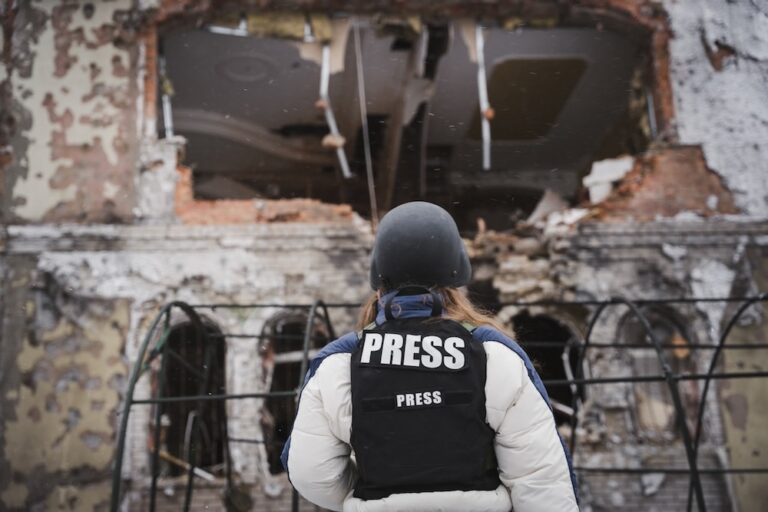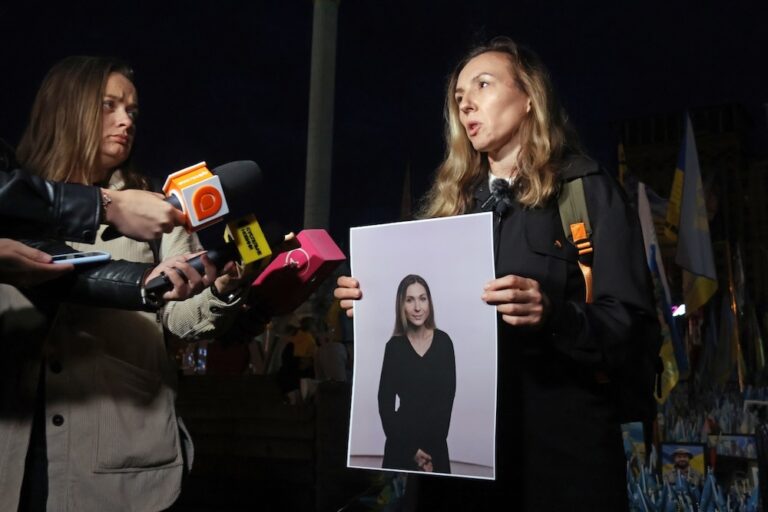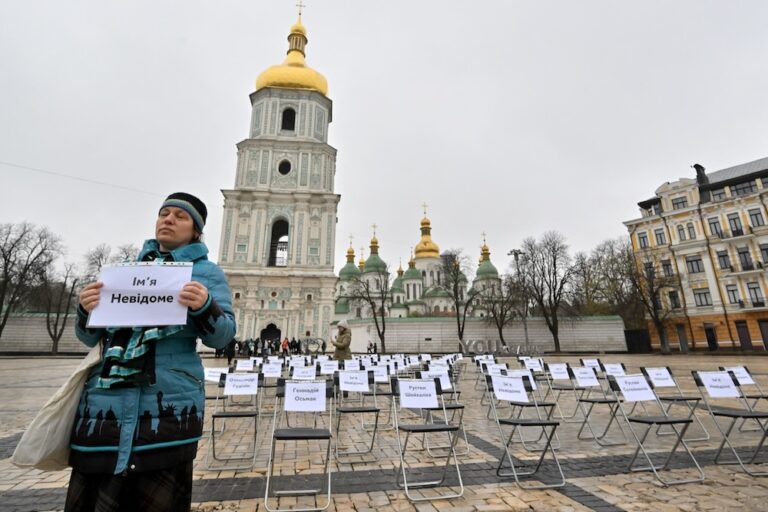(RSF/IFEX) – The following is an RSF press release: **For background information, see IFEX alerts of 29 October, 24 September, 28 July, 9 June and 5 March 1999** 9 November 1999 PRESS RELEASE Ukraine Twenty-five media harassed and four journalists threatened: presidential election marred by serious violations of press freedom With the second round of […]
(RSF/IFEX) – The following is an RSF press release:
**For background information, see IFEX alerts of 29 October, 24 September,
28 July, 9 June and 5 March 1999**
9 November 1999
PRESS RELEASE
Ukraine
Twenty-five media harassed and four journalists threatened: presidential
election marred by serious violations of press freedom
With the second round of voting in Ukraine’s presidential election due to go
ahead on 14 November, Reporters Sans Frontières recalls that in two months
of campaigning, about 25 media have been under various forms of pressure
from the government. Many journalists have been hindered in their work, from
being refused accreditation to dismissal from their jobs. At least four were
victims of threats after they wrote reports criticising the authorities.
Zurab Aslania, a journalist with TV Simon in Kharkov, eastern Ukraine, has
received several death threats: “I was told I would be killed a month after
the election”, she said on 10 October. The police are also reported to have
threatened to throw her family, who are from Georgia, out of Ukraine, even
though they have been there since 1993. Her father’s passport was seized and
her sister threatened with imprisonment. Zurab Aslania had been
investigating allegations of corruption involving people close to President
Leonid Kuchma. Olexandre Davtian, chairman of TV Simon, also claimed to have
received phone calls threatening to kill him. Leonid Zverev, a journalist
with the daily Chornomorsky Noviny (Black Sea News), and his family have
been receiving threats since 4 October, and his daughter was attacked by
strangers. Colleagues are convinced that the harassment is connected with
his reporting. Leonid Zverev said the secret service had offered him
“protection” on condition that he agreed to be less critical of the local
authorities. Orest Drul, editor of the daily Postup (Progress), said that on
5 October three strangers tried to break into his apartment after the
newspaper published a series of reports criticising the local government of
the Lviv region of western Ukraine.
On 14 October three opposition dailies, Rakurs, Nashe Zavtra and 21 Vek, in
the eastern region of Lugansk were missing from the newsstands. Their
different printing works had refused to handle them because they contained
articles giving an overview of President Kuchma’s time in power. The dailies
Chas in Chernivisti, south-west Ukraine, Dialog in the Kharkov region,
Novina in the Donetsk region and Dnepropetrovskaya Pravda, in the east of
the country, also came up against refusals to publish them for similar
reasons.
Pressure on the media may also take more insidious forms: tax inspections,
freezing bank accounts, hygiene inspections, visits from firemen, continual
mysterious “power cuts”… The privately owned TV Simon said it had been
subjected to about 200 checks and inspections of various kinds since April.
Meanwhile another private television channel, STB, saw Sergiy Koutsyj, who
admits to being a close adviser of President Kuchma, appointed as a member
of its board of management. Shortly beforehand, the channel’s bank accounts
had been frozen and it was warned that its broadcasting licence might be
withdrawn.
Intimidation of journalists may also take the form of “disciplinary”
sanctions. On 18 October Viktor Borissov, presenter of the programme
“Pidsumky” on the private TV channel Vikka, was forced to resign following a
live interview with opposition candidate Alexandre Moroz. The programme
“Epicentre-debaty” on the 1+1 channel was suspended on the day it was due to
receive several presidential candidates, officially because the presenter
was “unwell”.
Opposition candidates have had only very restricted access to the state
media. According to a survey, the public television channel UT 1 has openly
supported the outgoing president. Since October, debates in parliament,
which is dominated by the opposition, have not been broadcast by the state
media – in violation of Ukraine’s information law. On the other hand, the
same media have had no hesitation in organising full-blown smear campaigns
against opposition candidates, and in particular Alexander Moroz, who has
filed a complaint against state television. The denigration of opposition
candidates is sometimes done against the wishes of journalists working for
the public media. On 15 September Vuriy Nesterenko of UT 1 resigned after
one of his reports was manipulated without his knowledge. He said certain
libellous elements had been added with the aim of compromising an opposition
candidate.
Censorship does not hit only the Ukrainian media. Correspondents of the
Russian television channel NTV, which is known for its hard-hitting style,
have been unable to send reports from Kiev since mid-October.
Reporters Sans Frontières believes that these actions against the media
constitute flagrant and repeated violations of Ukraine’s international
commitments, particularly those made as part of the European Convention of
Human Rights. Our organisation calls on representatives of the Council of
Europe, to which Ukraine has belonged since 1995, to immediately reconsider
its standing as a member in the light of these recent violations of press
freedom.


